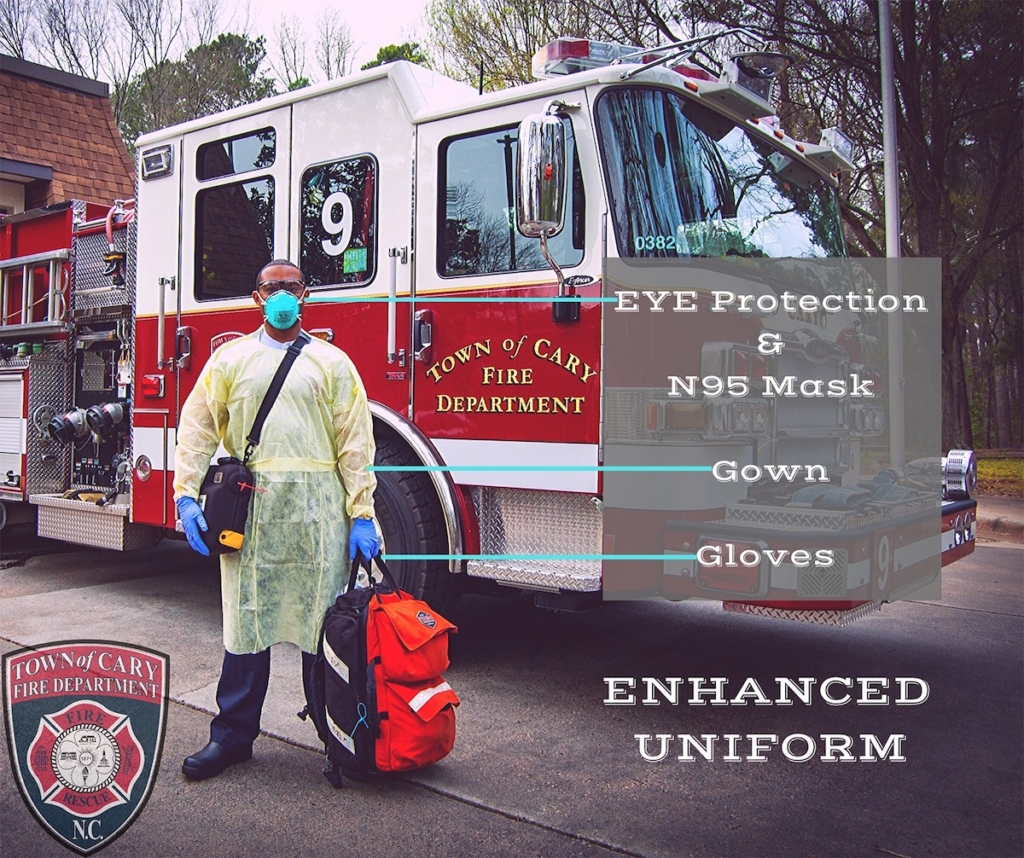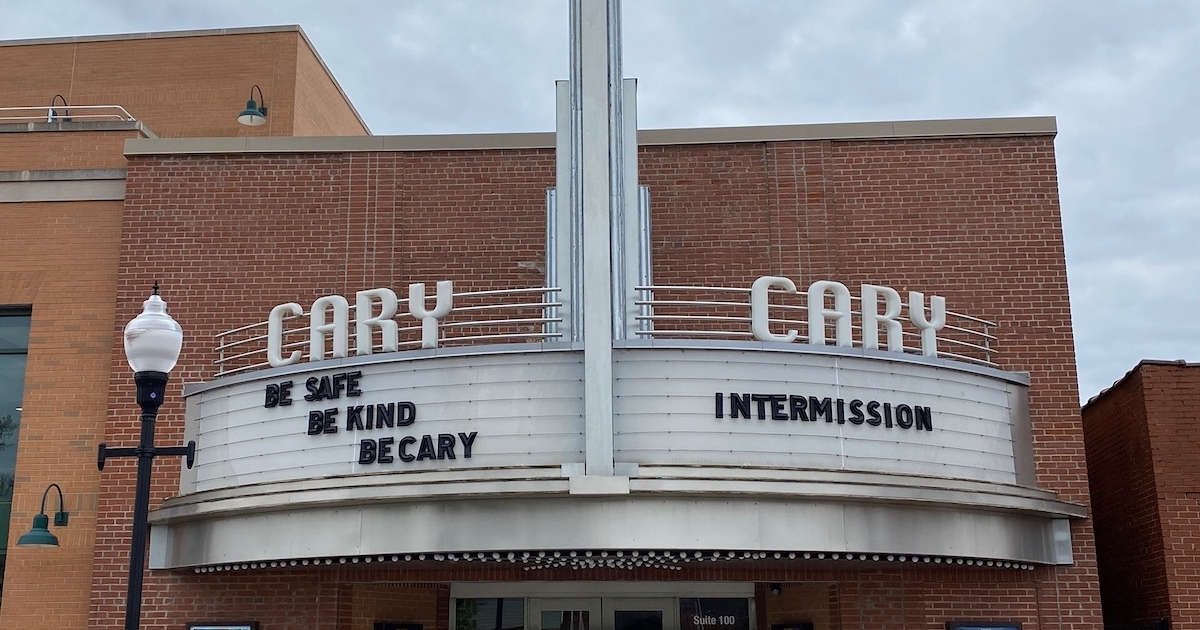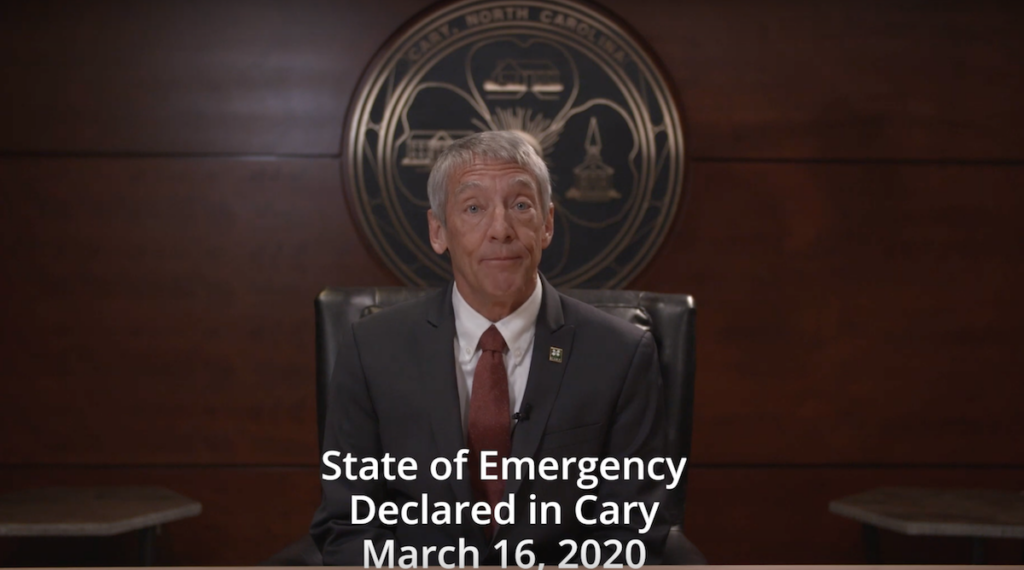Harold’s Blog: State of Emergency, New Covid-19 Restrictions, Citizen Safety and More
Cary, NC — This week Cary experienced its first full week of significant closures.
Monday – State of Emergency Declaration & Meetings
Monday started with a Public Service Announcement taping announcing to our citizens that Cary has declared a State of Emergency. Here are the comments I spoke from:
“Hello, I’m Harold Weinbrecht, Mayor of Cary, and I’m here today to share information about the Town’s response to the COVID-19 pandemic.
Today, I’m declaring a state of emergency in Cary. This follows similar declarations at the national, state, and county levels.
Now doing so in Cary is not meant to cause alarm to our citizens, but to give our police, fire, and other first responders the tools they need to bring our citizens safely through this trying time in the home we all share.
What does this mean for you? Only that you should continue taking all the precautions that will help us limit the impact of COVID-19 in Cary and get life back to normal sooner than later.
That means:
- wash your hands regularly and thoroughly, for at least 20 seconds.
- Avoid touching your face
- Cough or sneeze into the crook of your arm.
- Avoid public spaces unless absolutely necessary
- Practice social distancing when you do venture out, keeping at least six feet between you and others at all times
I know it can be difficult to change some of these behaviors. The reason I got into local government in the first place is that I love people, and it feels wrong to not greet them warmly with a hug or a handshake when I see them. But at least for the time being, that’s what we all have to do, to keep ourselves, our families, and our neighbors safe.
Finally, I want to encourage you to be good to yourself and others during this time. Especially now, when we’re all more isolated from one another than we’d like, it’s important to look for opportunities to let other people know they matter to you, whether through good deeds, extra patience, or simply a kind word. Check in with the people in your social circle and in your neighborhood, make sure they have what they need.
You can find the latest information throughout this time at http://townofcary.org/covid-19.
By working together and keeping each other’s needs in mind, we’ll get through this crisis stronger than before. Thank you for listening, and for everything you do to make Cary a great place to live.”
It is important to reemphasize that the purpose of this declaration is to give our police, fire, and other first responders the tools they need, not to cause alarm.
After taping the PSA I signed a state of emergency that would go into effect later in the day. The staff then worked on a press release to go along with the State of Emergency declaration.
Maintaining Essential Services

Cary Fire Department personnel have implemented an added layer of Personal Protective Equipment (PPE) when responding to medical calls.
In addition to typical gear, responders will have an N95 mask for respiratory protection, a disposable isolation gown, protective eyewear and exam gloves.
Monday afternoon I met with the town manager, chief strategy officer, and the director of public safety to go over new changes that were to take affect that evening. All the changes we made were with our public’s health and safety as the top priority. Although we were closing town hall and other facilities to the public, we were maintaining essential services: police, fire, water, wastewater, sanitation, and inspections related to those essential services. However, inspections will continue to operate as normal if the situation allows. Of course, all of this is fluid.
Next I visited the EOC (Emergency Operations Center) over in the police building. It was staffed with key personnel from about every department. They had two teams, one for operations and one for planning. The operational team is making sure essential operations remain up and running with the constant changes. The planning team is planning for all types of scenarios. Some of those scenarios would be drastic and expensive. Fortunately, Cary has planned well and has the General Fund to handle emergencies.
Monday evening I hosted a conference call with the mayors of Wake County instead of our monthly meeting. On the call were mayors from Apex, Cary, Fuquay-Varina, Knightdale, Morrisville, Rolesville, Wake Forest, and Zebulon. We spent a few moments discussing our finances and our holiday party venue for the end of the year since it has to be booked now. Most of our time was spent talking about issues related to COVID-19. Most mayors believed the county’s state of emergency was sufficient, while Apex, Cary, Fuquay-Varina, Zebulon, and possible Morrisville issued municipal state of emergencies. This allows us to cover things that are not covered by national, state, and county declarations. Our call concluded after about 45 minutes.
Tuesday – Delivering Meals to Children in Need
Tuesday my wife and I handed out meals to needy children in the Wrenn Drive area. Sadly the 200 meals only lasted 35 minutes. It breaks my heart to think how many children are in need in Cary. Thanks to Boston Market for providing the meals and to other businesses that are doing the same.
Wednesday – Virtual Meetings, Adapting to Work at Home
Wednesday I participated in a virtual meeting of the CAMPO (Capital Area Metropolitan Planning Organization). The meeting had four consent items, one public hearing, and five discussion items. The executive board approved a resolution supporting the S-Line and SA-Line. To find out more see http://campo.legistar.com/gateway.aspx?M=F&ID=8d369030-72bd-4dd5-984e-3d882458f2f4.pdf .
The board also received information on LAPP (Locally Administered Projects Program) which is an annual distribution of money to municipalities who have projects that score well against a set of criteria. The board was given an update on the SPOT 6.0 prioritization of projects. These are larger projects that are planned over a ten-year period. For example, two Cary projects would be the Maynard bridge over Chatham and the bridge over Chatham at Trinity. The 540 Allocation Program was presented to the board for their input and a status report for the Wake Transit Plan Update was given. Our meeting concluded after about an hour and forty-five minutes.
By Wednesday all my public interaction with my job at SAS and with the Town of Cary had ceased. Like many of us, I now spend almost all day in front of my computer in my home office.
Follow Guidelines, Unite and Lead the Way

A crisis like COVID-19 brings out the best in people and the worst in people. Most people are taking the guidelines seriously while there are a few that are ignoring them. Unfortunately for all of us, those few will likely result in further restrictions and further spreading of this deadly virus. Please don’t ignore guidelines and become a carrier! Even though you might be invincible there are others who are not, and you can give them COVID-19 through your actions. Don’t be responsible for the serious illness or possible death of others.
I have also seen some unfortunate comments in government that have resulted in racist acts. I issued a statement on Friday which addressed some of what I have seen:
“As we move through these unprecedented times and face a future clouded by uncertainty, one important constant we share as a community is the strength we derive from each other – from the ways we’re the same as well as the ways we are different.
This has been key to Cary’s success, and it will be vital as we each play a role in stopping the spread of COVID19. When choosing the way forward, our best decisions come when we listen and learn from the experiences and perspectives of others.
As the world unites to fight the COVID19 virus, I encourage each of you to unite in doing all that you can to support each other, including those making the hard decisions to help protect our health, safety , and welfare.
Cary will remain strong and successful by continuing to get to know the values, experiences, and talents that each of us offers. It’s only through mutual understanding, respect, and value that we can truly reach our full potential and happiness.”
I truly believe Cary can lead the nation in showing how a community should act in a time of crisis. Let’s show each other the love that has made Cary the greatest community in the nation.
Town Manager’s Report

The town manager, Sean Stegall’s report for this week included:
A Note to Mayor Weinbrecht and Members of Town Council:
In this “special edition” of the weekly report, my focus is on the “non-emergency” activities this week. As you are aware, Alan has been leading our efforts on that side and has been updating you on a daily basis. I am grateful to be able to work with a team of people who are supplementing our emergency efforts by adapting our organization to one that is working remotely in a way that has never happened in our history. So please enjoy the respite from the emergency daily briefings and find affirmation in your policy leadership that has created an environment where we can flourish.
Doing Things Differently During Times of Uncertainty
Over the past three and a half years, I’ve intentionally created a workplace that is changeable and adaptable in order to break old habits before they got us into ruts and encourage us to think differently about everything we do.
We’ve asked employees to re-examine everything we do and how we do it from why we provide a service to how we can do it better. With that mindset, we’ve achieved great results.
With the current uncertainties around COVID-19, we are seeing the importance of our purpose and values on full display. We must continue to challenge convention, dare to think differently, and always learn as we grow. It was Winston Churchill who said, “Never let a good crisis go to waste.” That’s precisely what I’m asking of every employee now.
During times of uncertainty and crisis, innovation often flourishes. Priorities are re-established (think Catalog), new systems of learning are discovered, and without an abundance of resources, we are forced to think differently about how we accomplish our daily work. Innovation and creativity are precisely what is occurring as our employees continue to set the standard for local governments and build on Cary’s legacy of excellence.
I want to take a moment to highlight a few examples:
- Planning, Inspections, and Development Services continued to hold pre-application conferences with our development partners (DRC Review) entirely remotely this week. In addition, Cary’s popular SPOT permits were completed remotely, as well as Express Plan Review. You can read more about serving our citizens through technology advancements and challenging convention in this article.
- Our 311 Advocates were equipped with new headsets that could function remotely. As of Wednesday, all Advocates began taking 311 calls from home. “They all rocked through the transition and our new way of working!” said 311 Supervisor, Kelli LaFrance-Girard. In addition, our Advocates assisted citizens with issuing a grading permit, a fence permit, and a rezoning application – three things that typically are handled at the front counter.
- One of our fundamental roles as an employer, processing payroll, occurred remotely and seamlessly this cycle. This resulted from some employee behavior changes, but also opened up many more opportunities for efficiencies and process improvements for the future.
- Enhanced knowledge sharing and learning is taking place like never before. Knowledge Base articles, which are crucial information channels into 311, are being written in real-time and shared with colleagues to help others solve common technology issues; stay up to date with new information about our business services; learn how to contribute in a future crisis; and suggestions on staying connected. Two examples of this knowledge sharing are:
1) The Emergency Operations Center shared information on how to learn more about crisis management via National Incident Management System (NIMS) learning modules, and
2) Employees banding together to teach each other how to work remotely by authoring tools and videos that share helpful efficiencies and tidbits. These tools will be beneficial to future daily working environment and crisis.
In closing, while we have many more days and weeks ahead of us during this period of uncertainty and crisis, I’m confident there will be many more silver linings ahead of us as well. We have been given time to reflect and learn what matters most to us. Let’s take full advantage of the opportunities presented by this crisis to continue learning, uncovering inefficiencies, and moving forward on process improvements that we knew we needed but hadn’t completed yet.
In appreciation,
Sean
A Supplemental Declaration, Adding Restrictions

As I prepared to post this on Sunday the 22nd the county and towns of Wake County implemented additional restrictions after discussions that began on Saturday. Here is my supplemental declaration to Cary’s State of Emergency:
SUPPLEMENTAL CONSENT TO THE DECLARATION OF THE EXISTENCE OF A STATE OF EMERGENCY IN THE TOWN OF CARY, NORTH CAROLINA
WHEREAS, on March 15th, 2020, I, Harold Weinbrecht, Mayor of the Town of Cary, North Carolina, declared the existence of a State of Emergency within the Town; and
WHEREAS, on March 11, 2020, the Chairman of the Chatham County Board of Commissioners issued a Proclamation of a State of Emergency for Chatham County; and,
NOW, THEREFORE, pursuant to the authority vested in me as the Mayor of the Town of Cary under Article 1 A of Chapter 155A of the North Carolina General Statutes and Chapter 12 of the Town of Cary Code of Ordinances, I, Harold Weinbrecht, Jr., pursuant to N.C. Gen. Stat. § 155A-19.22, do request and consent that the State of Emergency Proclamation issued by Chatham County apply in its entirety to the Town of Cary.
SECTION 5. Effective Date and Time. This Supplemental Consent to the Declaration of Emergency shall take effect immediately and shall remain in effect until modified or rescinded.
This adds the following restrictions in Cary:
1. Restrictions on nursing homes, long term care facilities and assisted living facilities operated pursuant to Article 6 of NC General Statute Chapter 131E:
- Owners, administrators, operators, staff, contractors, and volunteers of nursing homes, long term care and assisted living facilities are prohibited from allowing residents, customers, clients, or visitors from assembly in spaces that do not permit appropriate social distancing which consists of separation of 6 feet or more between each individual.
- Owners, administrators, operators, staff, contractors, and volunteers of nursing homes, long term care and assisted living facilities are prohibited from allowing a person to enter the facility and visit a resident unless each of the following criteria are met: (1) the visitor is an adult, (2) the resident has not already had a visitor that day; and (3) the visit takes place in the resident’s room. This prohibition does not apply to end of life situations.
- No person is allowed to visit a resident of a nursing home, long term care or assisted living facility unless the visitor has been screened prior to entry for signs and symptoms of COVID-19 including the following: fever of 100.4 or higher, cough, or difficulty breathing, contact in past 14 days with a person who has a confirmed diagnosis of COVID-19 or who is under investigation for COVID-19. All visitors may be required to take precautionary measures including, but not limited to, social distancing or wearing personal protective equipment.
- No person is allowed to visit a resident of a nursing home, long term care or an assisted living facility unless the visitor shows identification, signs into a visitor’s log that includes the date and time in and time out , and provide their name and contact information including phone number and email if available.
- Operators and staff of nursing homes, long term care and assisted living facilities are prohibited from destroying each day’s visitor log for a period of 30 days from that day.
- Owners, administrators, and operators of nursing homes, long term care and assisted living facilities are prohibited from allowing a person to work or volunteer in the facility unless the person has been screened, in the same manner and meeting the same criteria as Item 1(c) above, at the start of every shift and does not show any symptoms associated with COVID-19.
2. Prohibit the assembly of mass gatherings of 50 or more persons.
- A mass gathering is defined as any event or convening that brings together more than 50 persons in a single room or single space at the same time. A single space may include facilities such as an auditorium, stadium, arena, conference room, meeting hall, theater or any other confined indoor or outdoor space.
- A mass gathering does not include businesses and operations associated with maintaining federally identified critical infrastructure or operations and conducting essential activities. Federally identified critical infrastructure components consist of manufacturing, assembly, maintenance or operation of communications systems, defense industrial base operations, operation of dams, operation and maintenance of energy industries and distribution, food and agriculture, financial institutions, government facilities, water supply, wastewater treatment, nuclear reactors and material waste, information technology, transportation systems, healthcare and public health; critical manufacturing, chemical manufacturing, emergency services; social services and retail providers of essential goods such as grocery stores, pet stores, hardware stores, pharmacies, retailers and not for profit providing commodities or services essential for basic living. More specifically, for the purposes of this Order, other businesses excluded from this prohibition of mass gatherings of 50 or more people include:
- Healthcare Operations and Essential Infrastructure;
- Grocery stores, certified farmers’ markets, farm and produce stands, supermarkets, food banks, convenience stores, and other establishments engaged in the retail sale of canned food, dry goods, fresh fruits and vegetables, pet supply, fresh meats, fish, and poultry, and any other household consumer products (such as cleaning and personal care products). This includes stores that sell groceries and also sell other non-grocery products, and products necessary to maintaining the safety, sanitation, and essential operation of residences;
- iii. Food cultivation, including farming, livestock, and fishing;
- Businesses that provide food, shelter, social services, and other necessities of life for economically disadvantaged or otherwise needy individuals;
- Newspapers, television, radio, and other media services;
- Gas stations and auto-supply, auto-repair, and related facilities;
- Banks and related financial institutions;
- Hardware stores;
- Plumbers, electricians, exterminators, and other service providers who provide services that are necessary to maintaining the safety, sanitation, and essential operation of residences, Essential Activities, and Essential Businesses;
- Businesses providing mailing and shipping services, including post office boxes;
- Educational institutions—including public and private K-12 schools, colleges, and universities—for purposes of facilitating distance learning or performing essential functions, provided that social distancing of six-feet per person is maintained to the greatest extent possible;
- Laundromats, dry cleaners, and laundry service providers;
- Restaurants and other facilities that prepare and serve food, but only for delivery or carry out. Schools and other entities that typically provide free food services to students or members of the public may continue to do so under this Order on the condition that the food is provided to students or members of the public on a pick-up and take- away basis only. Schools and other entities that provide food services under this exemption shall not permit the food to be eaten at the site where it is provided, or at any other gathering site;
- Businesses that supply products needed for people to work from home;
- Businesses that supply other essential businesses with the support or supplies necessary to operate;
- Businesses that ship or deliver groceries, food, goods or services directly to residences;
- Airlines, taxis, and other private transportation providers providing transportation services necessary for Essential Activities and other purposes expressly authorized in this Order;
- Home-based care for seniors, adults, or children;
- Residential facilities include hotels, motels, shared rental units and shelters for seniors, adults, and children;
- Professional services, such as legal or accounting services, when necessary to assist in compliance with legally mandated activities;
- Childcare facilities providing services that enable employees exempted from the provisions of this Proclamation of Emergency Restrictions to work as permitted. To the extent possible, childcare facilities must operate under the following conditions:
- Childcare must be carried out in stable groups of 50 or fewer (“stable” means that the same 50 or fewer children and staff are in the same group each day).
- Children shall not change from one group to another.
- If more than one group of children is cared for at one facility, each group shall be in a separate room. Groups shall not mix with each other.
- Childcare providers shall remain solely with one group of children.
- Restrictions on the operation of certain businesses
- Owners, administrators and operators of fitness clubs, studios and gyms, salons, spas and professional grooming services are prohibited from operating.
- Restrictions on the use of playgrounds
- The use of publicly and privately-owned playground equipment is prohibited. No prohibition exists for the areas surrounding playground equipment including greenways, walking trails or other amenities of open spaces or parks.
Furthermore, I recommend that the following screening protocols be implemented:
- Recommend businesses enact temperature and respiratory screening prior to allowing employees to enter the workplace. Employers are encouraged to allow alternative work arrangements for all employees.
- Recommend retail businesses authorized to conduct business under this Order enact practices to check customer body temperatures and prohibit those with a fever greater than 100.4 from entering the establishment’s building. At the discretion of the business operator, exceptions may be made for businesses providing essential commodities such as fuel, groceries, medications and other basic living essentials.
I realize these restrictions are extraordinary, but these are extraordinary times. Please abide by all restrictions and help prevents death, illness, and additional restrictions.
My activities in the upcoming week my focus will be on issues related to COVID-19. Therefore, I have only tele-meetings scheduled with staff next week. As I end this weekly blog, I want you know that taking care of all Cary citizens and keeping them informed is my highest priority.
PLEASE BE SAFE!
Well, that is all for this week. My next post will be on Sunday, March 29th. Although I have Facebook and Twitter accounts those are not the best means of communications with me. Please send all Town of Cary questions or comments to [email protected] and email personal comments to [email protected].
From the blog of Cary Mayor Harold Weinbrecht. All photos courtesy of Town of Cary staff.




